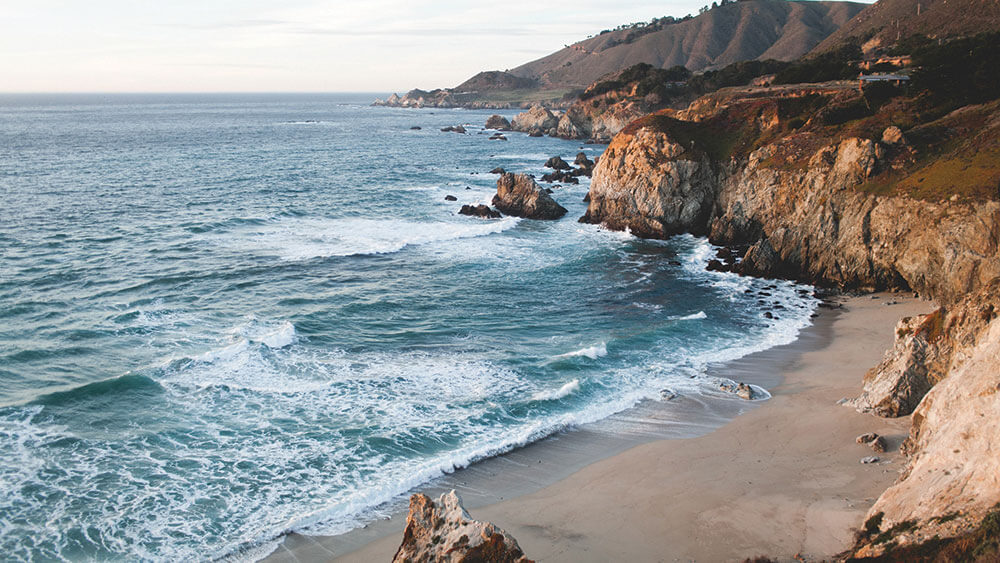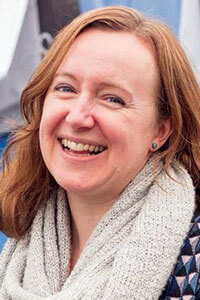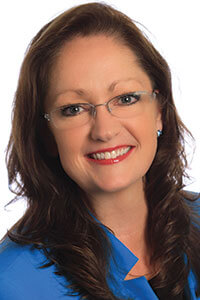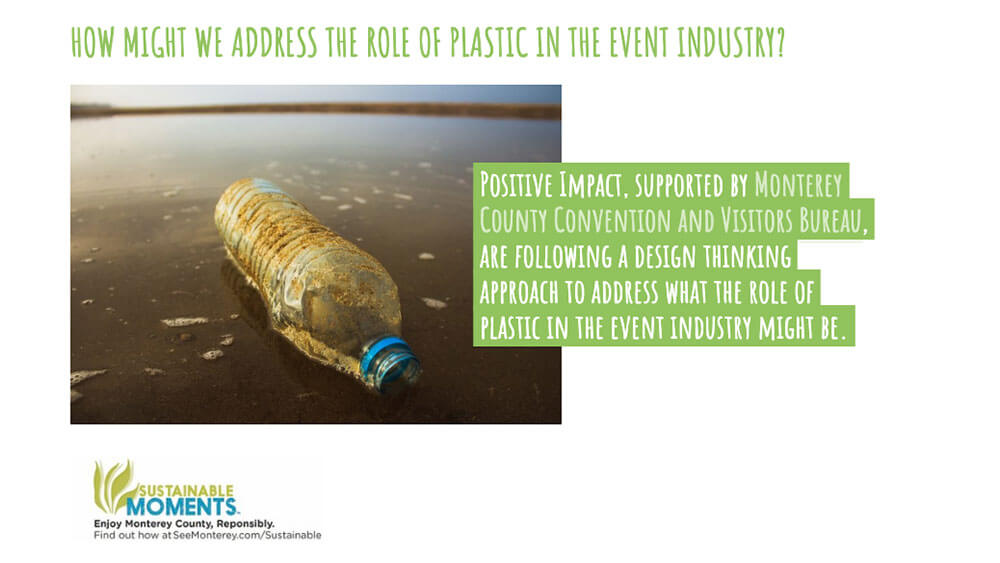
The joint Monterey CVB/Positive Impact initiative to address plastics in the events industry is designed to have a global reach.
A year ago, Fiona Pelham, CEO of the U.K.-based nonprofit Positive Impact, was attending a conference in Monterey, California, when a friend of a friend told her she really ought to connect with Tammy Blount-Canavan, president and CEO of the Monterey County Convention & Visitors Bureau (MCCVB).

Fiona Pelham
When they met, it soon was clear that the two — Pelham, who founded Positive Impact as a global nonprofit dedicated to event sustainability, and Blount-Canavan, whose destination considers sustainability and responsible tourism to be part of its DNA — shared a similar passion. “We started speaking about sustainability,” Pelham recalled, “and then I asked, ‘Do you want a really crazy, big idea?’ She said, ‘Yes, we do.’”
That big idea — a global initiative to address the role of plastics at events and conferences — launched the week of April 22, Earth Day. And while ambitious, it’s not so crazy: The program is designed to give event professionals the tools to 1) contribute data — via an app — that will help quantify the role that plastic plays in the events industry and 2) act now by pledging to reduce the use of plastic at events.
The campaign is collecting global data because, “the reality is that no one knows what the role of plastic is within the events industry,” Pelham said. The use of plastics has skyrocketed in recent decades, through single-use products including water bottles and plastic straws, as well as lanyards and carpeting, Blount-Canavan said. Meanwhile, the harmful effect of plastics on wildlife and the environment, including on oceans and marine life, also has spread — 25 percent of fish sold at California fish markets, for example, now contain plastic microfibers, according to data supplied by Positive Impact.
So while the first part of the campaign will collect data quantifying the use of plastic in the industry, Pelham said, the next step will be to identify alternatives to its use. “We’re first seeking to understand,” Blount-Canavan said, “and then to create a movement to replace those items with products that are more sustainable.”

Tammy Blount-Canavan
By using the app and contributing data, event organizers “will help us to assess the role of plastic so that we can get a better understanding to then address what those solutions are,” she said. “It’s really important that we create the awareness, that we gather the data, and then find solutions that are implementable and can be measured.”
MCCVB and Positive Impact have enlisted commitments of support from key associations and organizations within the global meetings industry, including PCMA, MPI, IMEX, Freeman, and others. Positive Impact also works with the team at the United Nations’ Environment Programme, raising the profile of the events industry within the agency’s work on responsible tourism, Pelham said. She’ll share the work Positive Impact is doing with MCCVB and the events industry so that U.N. Environment “can share our materials with their communities, and so that they can learn from what we are doing,” she added. “We can’t just stay insular as an industry. We need to reach out and work together.”
The initiative has been supported by years of work on a responsible tourism initiative in Monterey called Sustainable Moments, which addresses water and energy conservation, food waste, and other issues, Blount-Canavan said. “Sustainable travel and sustainable tourism is obviously something that’s very important to everyone. It’s important to our planet.”
The partnership with Positive Impact seemed like a natural next step, Blount-Canavan said. “We don’t want [people] to stop traveling, we want them to keep traveling. But we want them to be responsible about that, and to start a movement that hopefully inspires other destinations and meeting and event venues to start really taking a look at [event industry] practices and how we can be leaders in both growing economies, and all of the traditional things that we’ve done, but also inspiring conservation. There’s an opportunity to really inspire good things all over the world.”

A global initiative to reduce the use of plastics in the events industry launches the week of April 22, which is Earth Day.
A Grassroots Data Strategy
When participants sign the pledge that is part of the joint Monterey County Convention and Visitors Bureau/Positive Impact campaign to address the role of plastics in the events industry, they know exactly what they are getting into. In addition to promising to take action around measuring the impact of plastics at events they organize and to stay engaged and active, participants have a blank slate — actually, a blank field in a online form — when it comes to naming specific actions they will take.
By volunteering their own ideas about where they want to take action, participants are letting organizers know where they most need support, said Positive Impact’s Fiona Pelham.
Positive Impact will use the data contributed by event organizers that describes and measures the use of plastic at events to identify common areas that are ripe for the use of sustainable alternatives, Pelham said. The organization will then work with MBDC, a sustainability consulting and strategy company, to come up with workable alternatives, she said.
“It’s up to us,” Pelham said, “to raise the profile of the events industry in a responsible and positive way and say, ‘The events industry wants to be part of the solution, not part of the problem.’”
Barbara Palmer is Deputy Editor of Convene.
Related
PCMA Signs Commitment to Address Role of Plastic in Events Industry
